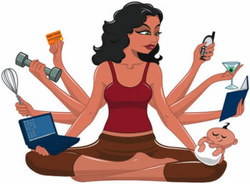 Sad news for all of us multitaskers out there: We’re not as effective as we think we are. Recently on NPR’s Science Friday, Clifford Nass, professor of communication at Stanford University, discussed the benefits of multitasking. Bottomline: There aren’t any. Here are some interesting highlights from the interview:
Here’s the interesting part: Nass says, “The research is almost unanimous…people who chronically multitask show an enormous range of deficits. They're basically terrible at all sorts of cognitive tasks, including multitasking…People who multitask all the time can't filter out irrelevancy. They can't manage a working memory. They're chronically distracted. They initiate much larger parts of their brain that are irrelevant to the task at hand. And they're even terrible at multitasking. When we ask them to multitask, they're actually worse at it. So they're pretty much mental wrecks.” So, once we convince ourselves that this is indeed true, what can we do to support ourselves being effective and present? Mindfulness meditation, a Westernized form of Zen Buddhist meditation, has been shown to help focus, memory and the ability to handle multiple jobs at once. One study showed that people trained in mindfulness meditation, versus those in the study who weren’t, stayed on tasks longer and made fewer switches between tasks, as well as experiencing less negative emotion when they were done. Improved memory was an additional benefit to those in the meditating groups. Here's what you can to for your own multitask recovery: Take 15 minutes each day to still your mind. Even if you don’t feel successful, you will be making great progress in retraining your mind to focus, concentrate and listen for divine ideas. Anything you do for those 15 minutes that allows you to think of as few things as possible will benefit your practice. You can listen to music and try to focus on the sounds rather than thoughts. You could watch a candle flame, focusing on the dancing flame instead of the many thoughts going through your mind. Some people like to listen to a guided meditation and follow along with the visualization. Other people like to use a mantra or affirmation that gives them a single idea upon which to focus. There is no wrong way to do it, as long as you find something that allows you to be as still as possible. Turn off Facebook, email, talk radio, television and your busy mind; and gain the benefits of focus and being present with yourself! |
Archives
April 2016
AuthorLynn Barrette, LCSW Blending psychology with spirituality, I offer tools for forgiveness, acceptance, meditation and relaxation, and positive parenting solutions. Categories
All
Archives
April 2016
|


 RSS Feed
RSS Feed